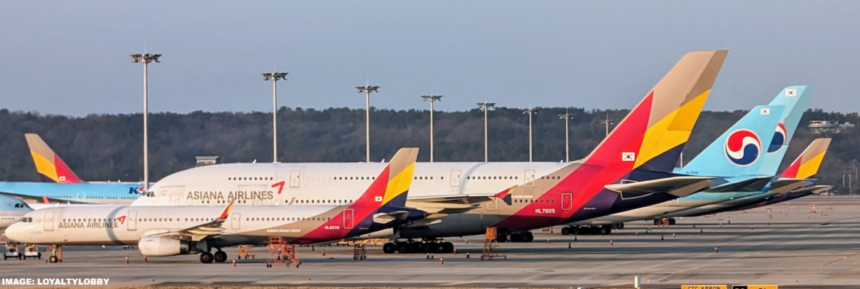Korean Air announced yesterday that it had acquired a controlling stake in its local rival Asiana and expects to complete the integration of these two airlines in two years.

Asiana will be folded into Korean Air, and Asiana’s two low-cost carriers, Air Busan and Air Seoul, will be folded into Jin Air. Five separate airlines will eventually become two, and Korean Air will stay within SkyTeam.
You can access Korean Air here, and Asiana here.
The process of integrating these five airlines into two will take a couple of years, and I don’t expect Asiana to disappear at least for another year.
Whether it remains a Star Alliance member throughout the entire process remains to be seen.
Korean Air’s Announcement:
Korean Air acquires 63.88% stake in Asiana Airlines
Korean Air has completed its acquisition of Asiana Airlines, four years after announcing its decision on November 16, 2020.
On December 12, Korean Air acquired 131,578,947 newly issued shares of Asiana Airlines, representing a 63.88% ownership stake and making Asiana Airlines a subsidiary of Korean Air
The completion follows Korean Air’s payment of KRW 800 billion to Asiana Airlines on December 11, concluding the share purchase transaction. This brings the total investment through the third-party allotment capital increase to KRW 1.5 trillion, including the previously paid deposit of KRW 300 billion and interim payment of KRW 400 billion.
Asiana Airlines will hold an extraordinary general meeting of shareholders on January 16 to appoint new board directors nominated by Korean Air.
Korean Air plans to complete the integration with Asiana Airlines within two years. The integration strategy includes network optimization through diversified flight schedules on overlapping routes, service expansion to new destinations and enhanced safety investments. The merger aims to strengthen national aviation industry competitiveness, enhance Incheon Airport’s hub capabilities and expand global network reach.
The integration will proceed without workforce restructuring. The combined organization projects natural staff growth through business expansion, with employees in overlapping functions being reassigned within the organization.
The integrated frequent flyer program framework will be submitted to the Korea Fair Trade Commission by June 2025. Program details will be communicated to customers following regulatory review.
The acquisition represents a strategic milestone for Korea’s aviation industry. Korean Air will proceed to implement measures to strengthen the country’s aviation capabilities and enhance its competitive position in the global market.
Timeline of Korean Air’s acquisition of Asiana Airlines
Date Milestone
November 16, 2020
Hanjin Group announces decision to acquire Asiana Airlines
November 17, 2020
Investment agreement signed by Hanjin KAL, Korea Development Bank and affiliated shareholders
Exchangeable bonds acquisition agreement signed by Hanjin KAL and Korea Development Bank
New shares acquisition agreement signed by Korean Air and Asiana Airlines
Perpetual bonds acquisition agreement signed by Korean Air and Asiana Airlines
December 2, 2020
Hanjin KAL raises KRW 500 billion from Korea Development Bank through new share acquisition
December 3, 2020
Hanjin KAL raises KRW 300 billion from Korea Development Bank through exchangeable bonds
Korean Air receives KRW 800 billion loan from Hanjin KAL
Korean Air makes KRW 300 billion down payment for new Asiana Airlines shares acquisition
December 29, 2020
Korean Air transfers KRW 300 billion won in perpetual convertible bonds to Asiana Airlines
January 14, 2021
Korean Air submits business combination reports to Korea Fair Trade Commission and 13 overseas competition authorities
February 4, 2021
Turkish Competition Authority approves merger
March 12, 2021
Korean Air raises KRW 3.316 trillion won from new share sale
March 15, 2021
Korean Air makes KRW 400 billion interim payment for new Asiana Airlines shares acquisition
May 4, 2021
Taiwan Fair Trade Commission approves merger
May 20, 2021
Thailand’s Office of Trade Competition Commission concludes review
May 25, 2021
The Philippine Competition Commission concludes review
September 9, 2021
The Malaysian Aviation Commission approves merger
November 11, 2021
Vietnam’s Ministry of Industry and Trade approves merger
February 8, 2022
The Competition and Consumer Commission of Singapore approves merger
February 21, 2022
The Korea Fair Trade Commission grants conditional approval of merger
September 1, 2022
The Australian Competition and Consumer Commission approves merger
December 26, 2022
The Ministry of Commerce of the People’s Republic of China approves merger
March 1, 2023
UK’s Competition and Markets Authority approves merger
January 31, 2024
The Japan Fair Trade Commission approves merger
February 13, 2024
The European Commission grants conditional approval of merger
May 2024
Korean Air begins route transfer of Europe routes to T’way Air
June 2024
Air Incheon selected as preferred bidder for Asiana’s freighter business
August 2024
Master agreement signed regarding sale of Asiana freighter business
November 26, 2024
Korean Air submits acquisition timeline for Asiana Airlines shares to U.S. Department of Justice
November 28, 2024
European Commission approves merger
December 12, 2024
Korean Air acquires 63.88% stake in Asiana Airlines
Conclusion
Combining two national airlines (or five) is not good for Koreans and those traveling to/from Korea because this will undoubtedly lead to higher fares and fewer choices.
Also, this will be a massive loss for Star Alliance, which will lose its alliance member in the Korean peninsula.
I have never quite liked Korean Air, but I have flown Asiana few times.







